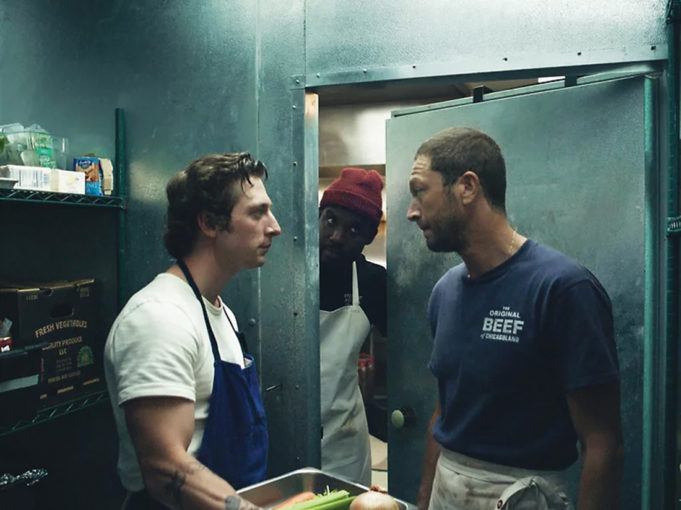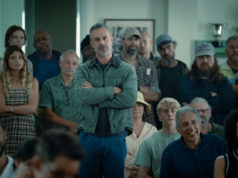“It might be 2022 out there,” the sign reads, “but in here, it’s still 1988.”
The words hang at Mr. Beef, the real-life Chi-town inspiration for The Beef of Chicagoland in The Bear.
After watching the hit comedic drama set in that restaurant, you can almost see showrunner Christopher Storer experiencing his a-ha! moment while looking up at the slogan.
One of the poignant elements is how Storer so subtly limns the weight of toxic masculinity that men have shouldered throughout the ages, especially in the femancipated late 1980s, in this loving tribute to his hometown. Yes, straight white guys. Finally, someone cares about you, too.
But there’s also a little something for the ladies, namely Carmy Berzatto (the insatiable Jeremy Allen White). Truly — DeNiro, be damned — the wise-guy swagger that filled Italian restaurants throughout the history of Chicagoland has never been better portrayed by any actor than this new kid.
Yes, in a modern era filled with screaming political pundits, YouTube podcasts, and song lyrics that say exactly what we should be thinking, the genius of The Bear is what’s left unsaid. This is nothing new as most great art is driven by the intrigue of mystery, of subtext, at least for audiences looking to be challenged as opposed to escape — nothing wrong with escaping, but still. What is new is the way The Bear does this so damn suspensefully at the same time, using every single second of its too-short 30-minute 8-episode catalog to grip us mercilessly in the throes of its poetic drama.
I don’t know if character actors are great because they’ve had to compete for parts against the inhuman perfection of movie stars, or if they just seem better because they look and sound like everyday people, but I am definitely sure that in this show it’s both. These people not only look like the folks I worked alongside in the service industry for years, but they also have an uncanny grasp on the attitude of kitchen workers as well. The bickering, impatience, wounds (there’s a huge burn scar on my hand from Simply Fondue that will never go away), tension, cigarettes, rage, discipline, bravado, charisma — it’s all there but in a far more palatable way than your local Chili’s as these characters seem to deeply care about this shabby establishment, an institution bearing the bloody, beating heart of Chicago.
One character that every female can relate to in all her underestimated and overachieving glory is Sydney (the stellar Ayo Edebiri). The way Edebiri stares pop-eyed holes in these people is enough to freeze your blood if her words don’t do it first. Like all women, she has learned to wield her words to cut deeper than any knife ever could. And the way that she goes up against Richie (Ebon Moss-Bachrach), who steals every scene with his side-splitting hilarity and magnetism that nobody would have ever expected from the wilted loser in Girls, is quite a fucking thing to behold.
The secret ingredient in the special sauce that brings this show together is the writing/directing. The closeups of all the grime on the floor are *chef’s kiss*. All good shows are made or broken by the writing, and the showrunners here can’t lose with track records of golden greatness for miles. Christopher Storer seems to be FX’s answer to Judd Apatow, with his uncanny ear for comedic greatness in producing Netflix comedy specials by guys like Bo Burnham, Ramy Yossef, and Drew Michael. FX must have paid top dollar to steal the hit-maker away from that streaming giant but not as much as they did for his secret weapon, Joanna Calo, who worked on award winners like Bojack Horseman and Hacks and took the show to its absolute high point when she stepped in on the third episode to direct and help write some of the series’ most powerful scenes. One can even see Storer bringing her on to carry the burden in a way no other can, much like Carmy and Sydney’s dynamic, for Storer to focus on writing and churning out one of the best monologues ever delivered in television history. It’s the heart-dropping “Al-Anon” scene, when Carmy finally splays the bloody guts we’d been pining after as much as his poor sister for two infuriatingly simmering episodes. Most viewers see using these support-group dialogues and platitudes as cloying, but something about the way Storer seems to see that and raise you tells us time and again he’s not bluffing.
To be able to write a show that is simultaneously this captivating and nuanced is a groundbreaking achievement. To get the youths to sit still and think, nay, even learn (like my 18-year-old)? That’s something. And what’s more? The Bear has pulled off the impossible: bringing us together in what feels like a more divisive time than any other. Seriously, do you know anyone who doesn’t love this show? The working class love it because of the authenticity, the white collars love it because of its artfully rendered cuisine, and anybody with any sense just simply loves it for every passionately crafted, intricate detail. The accomplishments range from brilliantly bridging the generational and gender gap with steady humor to using skillful acting to crack jokes that make you guffaw through tears and showing characters who flawlessly embody the perspective of every person with some skin in the game.












